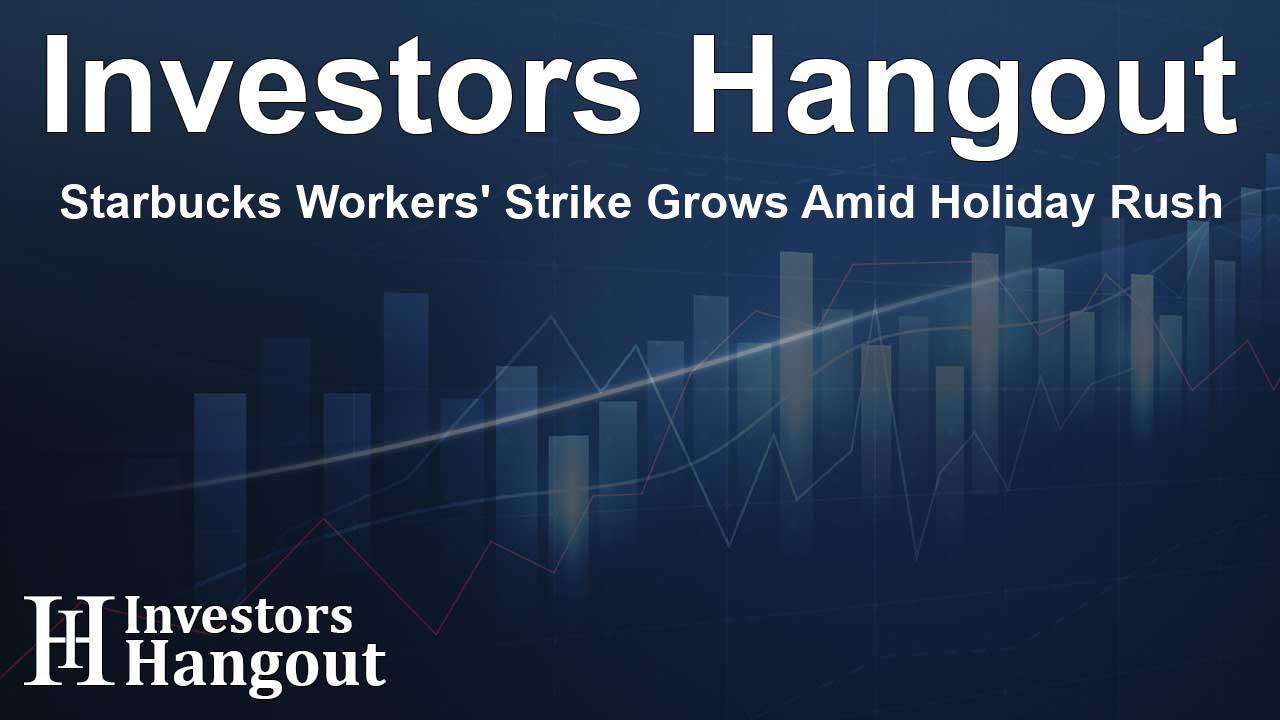Starbucks Workers Stage Expanding Strikes in Major Cities
Workers at Starbucks (NASDAQ: SBUX) are making headlines as they expand their strike across several U.S. cities, including New York. The movement, backed by a union representing over 10,000 baristas, aims to highlight ongoing frustrations regarding wages, staffing issues, and scheduling concerns.
Strike Timeline and Locations
The five-day strike commenced on a Friday and initially impacted Starbucks cafes located in Los Angeles, Chicago, and Seattle. In a dramatic escalation, the strike now includes additional cities such as New Jersey, New York, Philadelphia, and St. Louis. The details surrounding the New Jersey protest remain unspecified, but the union has made it clear that their influence is spreading.
Impasse in Negotiations
Discussions between Starbucks and the union have stalled, prompting the strike as a last resort to push for better conditions. Key issues that remain unresolved include the demand for higher wages, improvements in staffing levels, and more favorable work schedules for employees. The specialized focus on these core concerns reveals the serious nature of the dispute, especially as the holiday season approaches.
Impact on Starbucks Operations
The strike could disrupt operations significantly, with warnings from Workers United forecasting that the protest may extend to hundreds of Starbucks locations by the approaching Christmas Eve. This timing raises alarms about potential effects on sales during one of the busiest shopping periods of the year, potentially impacting customer experiences and company revenues.
Negotiation History
Starbucks began negotiating with the union back in April. As of this current month, the company has indicated that more than eight bargaining sessions have taken place, resulting in 30 agreements. Despite these supposed advancements, a comprehensive resolution remains elusive, reflecting the deep-seated challenges the coffee chain faces in satisfying its workforce.
Company Overview
Operating over 11,000 stores across the United States, Starbucks employs around 200,000 workers. This extensive network highlights the scale of the company's operations and the significant impact that labor disputes could have not just on employees, but also on customers and shareholders alike. The continuing unrest serves as a reminder of the complexities in labor relations within large corporations.
Frequently Asked Questions
What prompted the Starbucks strike?
The strike was initiated due to unresolved issues between Starbucks and the union, primarily involving wages, staffing, and scheduling.
Which cities are currently affected by the strike?
As of now, the strike has expanded to cities including New York, New Jersey, Philadelphia, and St. Louis, along with Los Angeles, Chicago, and Seattle.
How might this strike affect holiday sales?
The timing of the strike poses significant risks to Starbucks' operations during the holiday season, potentially impacting sales and customer service.
What has been Starbucks' response to the strike?
Starbucks has not publicly commented in detail on the strike, beyond mentioning the negotiations and agreements reached during past sessions.
How many employees are represented by the union?
Over 10,000 baristas are represented by the union, indicating a considerable portion of Starbucks' workforce is involved in the strike actions.
About Investors Hangout
Investors Hangout is a leading online stock forum for financial discussion and learning, offering a wide range of free tools and resources. It draws in traders of all levels, who exchange market knowledge, investigate trading tactics, and keep an eye on industry developments in real time. Featuring financial articles, stock message boards, quotes, charts, company profiles, and live news updates. Through cooperative learning and a wealth of informational resources, it helps users from novices creating their first portfolios to experts honing their techniques. Join Investors Hangout today: https://investorshangout.com/
Disclaimer: The content of this article is solely for general informational purposes only; it does not represent legal, financial, or investment advice. Investors Hangout does not offer financial advice; the author is not a licensed financial advisor. Consult a qualified advisor before making any financial or investment decisions based on this article. The author's interpretation of publicly available data shapes the opinions presented here; as a result, they should not be taken as advice to purchase, sell, or hold any securities mentioned or any other investments. The author does not guarantee the accuracy, completeness, or timeliness of any material, providing it "as is." Information and market conditions may change; past performance is not indicative of future outcomes. If any of the material offered here is inaccurate, please contact us for corrections.
